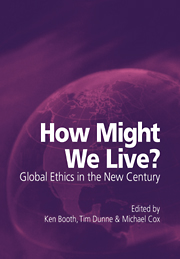Book contents
- Frontmatter
- Contents
- Notes on Contributors
- Acknowledgements
- Foreword
- Introduction: How Might We Live? Global Ethics in a New Century
- Individualism and the Concept of Gaia
- Bounded and Cosmopolitan Justice
- Globalization From Above: Actualizing The Ideal Through Law
- A More Perfect Union? The Liberal Peace and the Challenge of Globalization
- International Pluralism and the Rule of Law
- Towards a Feminist International Ethics
- Contested Globalization: The Changing Context and Normative Challenges
- Universalism and Difference in Discourses of Race
- Does Cosmopolitan Thinking Have a Future?
- Individuals, Communities and Human Rights
- Thinking About Civilizations
- Index
Universalism and Difference in Discourses of Race
Published online by Cambridge University Press: 04 August 2010
- Frontmatter
- Contents
- Notes on Contributors
- Acknowledgements
- Foreword
- Introduction: How Might We Live? Global Ethics in a New Century
- Individualism and the Concept of Gaia
- Bounded and Cosmopolitan Justice
- Globalization From Above: Actualizing The Ideal Through Law
- A More Perfect Union? The Liberal Peace and the Challenge of Globalization
- International Pluralism and the Rule of Law
- Towards a Feminist International Ethics
- Contested Globalization: The Changing Context and Normative Challenges
- Universalism and Difference in Discourses of Race
- Does Cosmopolitan Thinking Have a Future?
- Individuals, Communities and Human Rights
- Thinking About Civilizations
- Index
Summary
A few weeks after the riot that shook Los Angeles in May 1992, I gave a lecture on racism in America to a group of students at a north London college. The audience was largely young and black. In the discussion that followed, there was a lively debate over my view that the fragmentation of American society into competing ethnic groups—African-Americans, Hispanic-Americans, Korean-Americans, and so on—was a fatal blow to the struggle for black rights. Almost the entire audience disagreed. ‘African-Americans’, one student explained, ‘are different. Our problems are different, our experiences are different, our history is different and our culture is different. We have to gain respect ourselves before we can unite with other people.’
Here was summed up the core ideas that underpin much of current radical thinking on race: first, that social groups define themselves by their history and identity; second, that the particular history and identity of each group sets them apart from other social groups; third, that it is important to recognize this plurality of differences as a positive aspect of society today; and finally, that the struggle for racial equality takes the form of a struggle for group identity.
The ‘assertion of difference’ has become, for many radicals, the principal dynamic in society today. ‘The emergence of new subjects, new genders, new ethnicities, new regions, new communities’, claims sociologist Stuart Hall, has given hitherto invisible groups ‘the means to speak for themselves for the first time’.
- Type
- Chapter
- Information
- How Might We Live? Global Ethics in the New Century , pp. 155 - 178Publisher: Cambridge University PressPrint publication year: 2001



